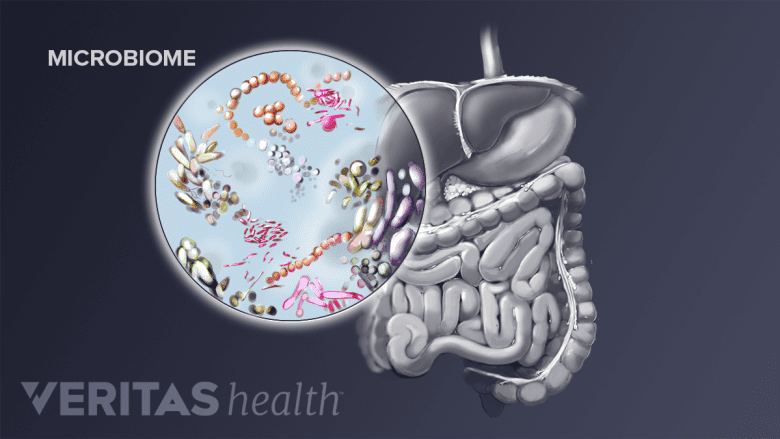Genetics, environment, age, and sex have long been recognized as influencing factors in the development of autoimmune arthritis, such as rheumatoid arthritis (RA), psoriatic arthritis and ankylosing spondylitis. More recently, scientists have learned that the bacteria and other microbes that live in the digestive tract—collectively called the gut microbiome—are also a factor.
In This Article:
- Connections Between the Gut Microbiome and Arthritis
- Gut Microbiome Health and Diversity
- Reduce the Risk of Arthritis by Improving the Microbiome
For example, research shows:
- The digestive tracts of people with rheumatoid arthritis have relatively—
- High levels of a bacterium called Prevotella copri.1Pianta A, Arvikar S, Strle K, et al. Evidence of the Immune Relevance of Prevotella copri, a Gut Microbe, in Patients With Rheumatoid Arthritis. Arthritis Rheumatol. 2017;69(5):964-975.
- Low levels of a genus of bacteria called Bifidobacterium.2Vaahtovuo J, Munukka E, Korkeamäki M, Luukkainen R, Toivanen P. Fecal microbiota in early rheumatoid arthritis. J Rheumatol. 2008;35(8):1500-5.
- More potentially pathogenic (potentially disease causing) bacteria.3Eerola E, Möttönen T, Hannonen P, et al. Intestinal flora in early rheumatoid arthritis. Br J Rheumatol. 1994;33(11):1030-8.
- A gene called HLA B27 is associated with changes in the gut microbiome.4Rosenbaum JT, Davey MP. Time for a gut check: evidence for the hypothesis that HLA-B27 predisposes to ankylosing spondylitis by altering the microbiome. Arthritis Rheum. 2011;63(11):3195-8. People who carry HLA B27 are known to have an increased risk of developing ankylosing spondylitis, psoriatic arthritis, and other spondyloarthritic diseases.
- Being breast fed reduces the likelihood a person will develop ankylosing spondylitis.5Montoya J, Matta NB, Suchon P, et al. Patients with ankylosing spondylitis have been breast fed less often than healthy controls: a case-control retrospective study. Ann Rheum Dis. 2016;75(5):879-82. Breast-feeding is known to change babies’ gut microbiome.
See Risk Factors for Rheumatoid Arthritis (RA)
These are just a few examples among the growing body of knowledge that links the gut microbiome to RA and other autoimmune forms of arthritis.
Microbes, Microbiomes, and Gut Microbiomes

Maintaining a healthy gut microbiome may help to reduce symptoms of inflammatory arthritis.
In order to understand how the gut microbiome may affect susceptibility to rheumatoid arthritis, psoriatic arthritis, and ankylosing spondylitis, it is important to understand a few basic concepts:
- Microbes include bacteria and other microorganisms called eukaryota and archaea. Viruses are usually considered part of this group as well.
- A microbiome is the dynamic collection of microbes in an ecosystem. The human body hosts a variety of microbiomes. About 3 pounds of microbes live inside a person’s body and on his or her skin. (Animals, plants, and other environments, like soil, also have microbiomes. Even buildings, like homes and hospitals, have their own microbiomes.)
- The gut microbiome refers to the microbes that live along the digestive tract, from the mouth to the anus. The majority of a body’s microbes live here, and most of those are located in the intestines.
Gut microbes serve many purposes. They:
- Help form and train the immune system and can jump-start it into action.
- Help breakdown food and absorb nutrients.
- Regulate natural chemicals called neurotransmitters that communicate with the brain and nervous system, affecting things like mood, memory, and sleep.
- Help regulate hormones, such as insulin, to keep the body balanced.
See Improving the Gut Microbiome and Arthritis Symptoms with Diet
Microbes influence so many bodily functions; it is no wonder that they can contribute to the development of diseases such as rheumatoid arthritis.
See The Science Behind Leaky Gut, the Gut Microbiome, and Arthritis
- 1 Pianta A, Arvikar S, Strle K, et al. Evidence of the Immune Relevance of Prevotella copri, a Gut Microbe, in Patients With Rheumatoid Arthritis. Arthritis Rheumatol. 2017;69(5):964-975.
- 2 Vaahtovuo J, Munukka E, Korkeamäki M, Luukkainen R, Toivanen P. Fecal microbiota in early rheumatoid arthritis. J Rheumatol. 2008;35(8):1500-5.
- 3 Eerola E, Möttönen T, Hannonen P, et al. Intestinal flora in early rheumatoid arthritis. Br J Rheumatol. 1994;33(11):1030-8.
- 4 Rosenbaum JT, Davey MP. Time for a gut check: evidence for the hypothesis that HLA-B27 predisposes to ankylosing spondylitis by altering the microbiome. Arthritis Rheum. 2011;63(11):3195-8.
- 5 Montoya J, Matta NB, Suchon P, et al. Patients with ankylosing spondylitis have been breast fed less often than healthy controls: a case-control retrospective study. Ann Rheum Dis. 2016;75(5):879-82.
Editor’s Top Picks
- Understanding the Different Names and Classifications for Spondyloarthritis (SpA)
- Improving the Gut Microbiome and Arthritis Symptoms with Diet
- The Science Behind Leaky Gut, the Gut Microbiome, and Arthritis
- Conditions Related to Inflammatory Arthritis
- Foods for a Healthier Gut and Less Arthritis Pain
- Types of Arthritis


